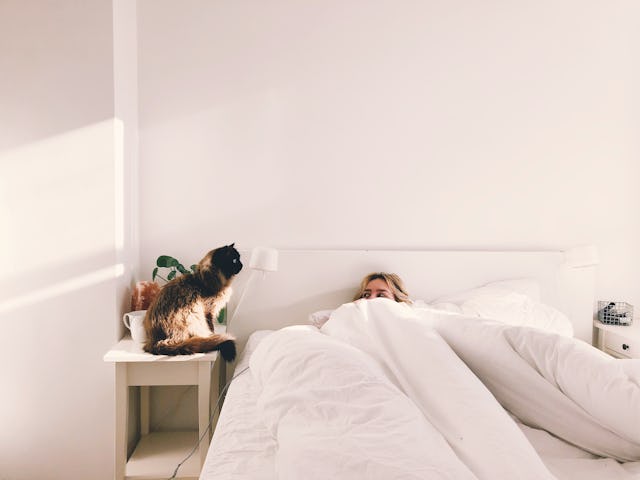It’s Not Just Your Imagination: Your Pandemic Pet Is Needy AF
“The pandemic affected so many aspects of life, and pets certainly weren't immune to it,” Holly Sizemore, Chief Mission Officer at Best Friends Animal Society, explains.

Like many people, I adopted a pet during the pandemic. Specifically, a black kitten named Olive. She was my sole companion for many months. A tight bond was formed. Little did I know just how “tight” we would become.
Let me paint you a picture: Whenever someone calls me or FaceTimes me or Zooms me — basically, whenever anyone, other than Olive, comes into my vicinity — Olive must make her presence known. She will jump on me, cry at me, even bite me to remind me that, yes, she is here too. Whenever I watch TV, she must sleep on top of me. At night she lies between my legs. She can’t get enough of me. Three years later, and nothing has changed. She still makes me the center of her universe in a way that I’ve never experienced before with any of my prior cats. When friends visit me, she cowers away and hisses, revealing a side of her that I don’t recognize, but making it clear: She wants me and only me!
While I love the attention from my furry friend, it’s a lot to handle. Dare I say, it’s needy? I mean, a person needs their personal space! Curious, I asked other pet parents who adopted during the pandemic about their experience, and the consensus was clear — we’ve got some codependent critters on our hands.
“The pandemic affected so many aspects of life, and pets certainly weren't immune to it,” Holly Sizemore, Chief Mission Officer at Best Friends Animal Society, tells Scary Mommy. “However, just like children, animals are complex creatures with a wide array of behaviors and emotional responses, and it can be tricky applying cause and effect to such complex individual situations.”
Like people, Sizemore notes that some pets that got used to people being home much more during the pandemic might have struggled for a bit to re-adapt to being home alone. Others might have adapted easily to their humans leaving again for the workday.
“A few pets likely struggled during the pandemic with never getting a moment alone, as I'm sure many parents can relate,” Sizemore says. “Pets are very resilient, but they also need help in navigating big changes in their lives and routines, so it's always a good idea to consult your veterinarian, animal behaviorist, or online resources from pet experts to help your pet through a significant transition.”
With life back to fairly “normal” again, including an upcoming European vacation, I struggle with leaving Olive alone with friends. How will she adapt? Will she stop hissing at strangers? Will she ever be OK with sharing me with the rest of the world? If you can relate, Sizemore shares some advice to handle your needy pandemic pet.
Why Your Pandemic Pet Might Be More Codependent Than Others
Like people, Sizemore points out that cats and dogs are individuals with their own unique personalities. “You can have a pair of kittens that you raised since babies and treated very similarly, but one might grow up to be a bit shy and the other really desirous of human attention,” she says. “Certainly, like humans, pets benefit from appropriate socialization and can learn (and unlearn) certain behaviors depending on their environment, experiences, and training. But just like in humans, nature and nurture (genetics and environment) are both at play and intertwined in complex ways in our pets.”
How To Break A Codependent Pattern In Your Pet
Who doesn’t love attention from their pet? But it can get out of hand if they’re constantly distracting you from work calls. Luckily, Sizemore says we can train our pets to not be as needy. In fact, she says we're all training our cats and dogs all day long without even realizing it. “Simply keep in mind that if you reward a behavior, your pet will do it more often. For example, if your dog or cat is being needy and you give them some pets to try to pacify them, you just trained them that neediness gets rewarded with attention.”
Instead Sizemore suggests finding something your pet loves (pro tip: it's usually treats) and rewarding them when you catch them not being needy. “Try to ignore needy behavior and reward independent behavior, and both you and your pet will feel happier,” she says.
How To Help Your Codependent Pet Become More At Peace With Your Absence
According to Sizemore, there are two key things you can do when you leave the home to help a codependent cat feel more at peace with your absence.
“First of all, you should leave them in an enriched environment. Set out some different toys (it's helpful to rotate toys to prevent boredom), for cats you can try some catnip (if your cat likes it), and leave their food in a food puzzle so their brains and bodies are occupied while you're gone,” she recommends. “Secondly, make sure the act of leaving is not a big deal. Cats and dogs feed off of our emotions. So, if you make your exit quick, upbeat, and happy, your pet may not even realize that you're leaving!”